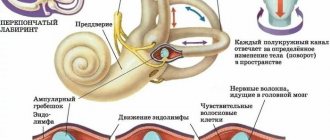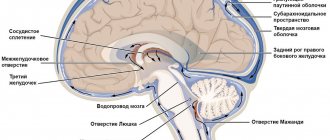- Diagnosis
- Causes
- What to do
Dizziness (vertigo) is a condition in which a person feels as if his body or objects around him are moving, although in fact they are motionless. This is a common reason for visiting a doctor. Unpleasant sensations cause discomfort to a person and serve as a symptom of pathology occurring in the body, especially if they appear constantly and have a long-lasting effect. Therefore, it is very important to find out the causes of frequent dizziness.
Spinning, spinning, wants to fall
Once you experience dizziness, it cannot be confused with anything else.
It seems that the ground is disappearing from under your feet, surrounding objects are either approaching or moving away, coordination of movements is disturbed, sometimes there is not enough air, thoughts are confused, and fainting can become an apotheosis. The reasons can be both relatively harmless and very serious, some requiring urgent hospitalization.
Unpleasant, but no big deal
Reasons that do not cause serious damage to the body include:
- Lack of air in the room - then ventilation, access to fresh air or at least open space is enough;
- Motion sickness in transport is a feature of the body that can be corrected with special medications;
- Side effects after taking certain medications. Easily calculated if you have recently started taking medications.
Women often experience side effects after switching to new hormonal medications. Most often - contraceptives. And not only in tablet form. You may experience dizziness if you decide to protect yourself with a vaginal ring containing doses of estrogen, a coil, a patch, or an injection. It happens that doctors prescribe hormonal drugs not to protect against unwanted pregnancy, but to treat fibroids, inflammation, cysts and other problems in the female genital area. These medications can also cause dizziness.
It’s rare, but it still happens that the reason is non-hormonal contraceptives: the spiral, the cap. Perhaps this is how their individual intolerance manifests itself.
The solution in this case is to stop taking and using dangerous drugs and products. Or (if there is no other way out, when the risks of withdrawal exceed the consequences of unpleasant manifestations), at least pay attention to the body’s reactions, try not to be in dangerous places during this period (in hazardous industries, at high altitudes, etc.). You need to monitor your condition even more carefully than usual with the participation of your doctor.
Correction of the effects of dizziness.
When you need to see a doctor urgently!
There are also health problems when dizziness is only a symptom of serious illnesses. If they are not noticed and left to chance, there is a real risk to life.
- Diseases of the inner ear (it is “responsible” for the vestibular apparatus). The most famous is otitis media. But even this in most cases requires taking antibiotics. But there are many such diseases, and only a doctor will determine exactly which one you have. He will prescribe the optimal treatment.
- Viral and (or) infectious diseases. For example, the flu can be accompanied by dizziness, especially if it is carried on your feet. Then the risk of complications increases, then it’s unlikely to get away with just dizziness! You risk developing a chronic disease and ending up in a hospital bed for a long time.
- Tumors – benign and malignant. You should try to identify them as early as possible, observe or remove them! It is impossible to do this on your own, but any delay is deadly. If nothing else particularly bothers you other than dizziness, you need to be wary. Doubts will be dispelled: MRI, CT or ultrasound. A specialist will determine what kind of examination is required. Therefore, urgently see a doctor!
- Diseases of the circulatory system. There are a lot of them, each is serious in its own way, and launching them is fraught with risk to life.
- Problems with the spine. Curvatures, hernias, and protrusions disrupt the functioning of the entire body, interfere with normal blood flow (especially to the head) and cause very severe dizziness. Fortunately, diseases of the spine in most cases do not go unnoticed. In most cases, a person knows that he has problems with his back, he experiences pain, his neck cannot turn... And therefore, another symptom - dizziness - is more likely to be associated with the correct cause. But this does not mean that you need to calm down. This will only narrow your circle of doctors to a therapist, neurologist, massage therapist, chiropractor or osteopath.
The head may feel dizzy from ARVI.
Some ailments are diagnosed immediately. The same flu or other viruses “crash” the body so much that dizziness appears on the large list of symptoms. Others, for example, tumors, may insidiously not manifest themselves in any way other than dizziness, and the person will attribute the dangerous symptom to fatigue or other understandable and harmless factors. Any suspicious reaction of the body therefore needs to be analyzed; if in doubt, it is better to seek advice once again.
Who should I go to if I feel dizzy? Start with your primary care physician. He will refer you for additional examinations to specialized specialists: a neurologist and, for women, a gynecologist.
Representatives of both sexes are susceptible to the above diseases, regardless of age. Doctors, however, claim that it is women who often come to them with symptoms. It so happens that the fair sex pays more attention to health.
But there are also specific “female” causes of dizziness.
Causes of severe and prolonged dizziness
Constant dizziness in women and men, unlike rare ones that occur during sudden movements, poisoning or alcohol intoxication, can be caused by serious diseases, so it is necessary to know their symptoms and treatment.
Neurological causes
Frequent attacks of dizziness can occur due to damage to the nerve endings, as well as the circulatory system of the brain. Systemic vertigo causes migraine, meningitis, encephalitis, tumors of various origins, multiple sclerosis, epilepsy, strokes in the brain stem structures and in the cerebellum, vertebrobasilar syndrome, which occurs due to insufficient blood flow to the brain tissue.
ENT pathologies
Chronic dizziness causes inflammation of the vestibular apparatus, which occurs in the hearing organs or nearby nerve fibers. In these cases, chronic nausea often occurs. These are pathologies such as injuries to the internal organs of hearing, ischemia of the vessels of these organs, purulent processes in them, Meniere's disease and others.
Cardiovascular disorders
Frequent dizziness in women can be caused by menopause or menopause. In addition, there are common cases when constant vertigo occurs due to diseases of the heart and blood vessels, arrhythmia, diabetes, thyroid dysfunction, and sudden jumps in blood pressure.
Psycho-emotional disorders
Psycho-emotional reasons are hidden in external factors. This is stress, great excitement. An overly emotional woman, for example, may feel dizzy several times a day, becoming chronic. This condition is often aggravated by tachycardia, rapid breathing, and weakness of the arms and legs.
Heavy female share
That's what our ancestors would say. In the modern world this is, of course, not the case. To be a woman today means to be in no way inferior to a man. But still, in the 21st century there are specific women’s health problems, including dizziness.
- Pregnancy.
- Hormonal disbalance.
- Climax.
The joy of motherhood makes your head spin
The very first signs of pregnancy, “played out” in TV series and novels, are nausea and dizziness. They are perceived as scary, especially when the expectant mother does not yet know what awaits the baby. This means that at the first manifestations of dizziness, you should think about this topic and check - take a pregnancy test. If it is confirmed, there is a high probability that the cause of dizziness is precisely the new state of the body. In most cases, this is a normal individual reaction. But it’s also a reason to see a gynecologist faster. Perhaps he will advise additional strengthening medications, vitamins, microelements, prescribe examinations, and call for a more gentle regimen. Don't worry - this is for your own peace of mind.
The hormonal system has failed
The normal balance of hormones in the female body can be disrupted not only after taking certain medications (as discussed above). This happens during puberty, after miscarriages, abortions, and from severe stress.
For some reason I’m in a bad mood and my head is spinning...
Women's age
This is no longer a temporary hormonal imbalance, but a serious restructuring of the body in a new way.
What to do if you feel dizzy? Lie down, sit, or lean against a firm, vertical surface. At the first opportunity, seek help from passers-by, call 112, or call your family.
Sex hormones will not return to their previous levels, the body’s condition will stabilize, but from several months to several years the woman may suffer from dizziness.
Correction of well-being is possible, but rarely on your own; consultation with specialists is needed. It is not necessary to be the “heavy artillery” – a gynecologist, although it is necessary to see him. In many cases, herbal medicine, aromatherapy, homeopathy really help...
A neurologist explains why your head hurts and what to do about it
Tension headache
This is an obsessive pulsation in the forehead, temples, and back of the head, which develops into pressing pain. There is a pattern: it occurs after stress or a busy day at work.
Treatment is rest, or better yet, sleep. If this does not help, you should take a painkiller tablet. To avoid the pain of tension, stop straining so much. Sleep well, eat well, work in a comfortable position, and consult a psychologist on time.
Migraine
Migraine pain is severe and throbbing. Most often - in the area of the eye, temple, forehead, and back of the head on one side. In 20% of all cases, it begins with an aura - blurred vision and a weak, aching headache that gets worse over time. Trying to maintain your usual activity only makes things worse. Lights and sounds irritate, nausea appears, and sometimes vomiting. The person becomes sleepy. This is how the body protects itself from excessive pain signals.
Painkillers do not help; you need medications prescribed by a doctor. He will also prescribe preventative treatment.
Cluster headaches
One attack consists of many short painful volleys, “shooting” into the eye. The pain is always one-sided and extremely intense. The attack lasts from 15 minutes to an hour and a half, occurs daily or several times a day for several months, after which remission occurs. During attacks, a person screams, cries, hits himself on the head, trying to get rid of the excruciating pain. The attack is stopped by inhaling oxygen through a mask and special injections.
Calcium channel blockers are prescribed as a preventative measure.
Abuse headaches
Punishment for those who are heavily addicted to painkillers. These are pressing headaches that appear in the morning and accompany a person throughout the day. Physical activity only makes it worse, but sleep doesn’t help. Where exactly it hurts is different for everyone. They are treated by stopping painkillers and prescribing antidepressants.
There is only one preventive measure: strict adherence to the doctor’s prescriptions. Neurologist Anton Aleksandrovich Ryvaev explained:
“Many patients come to the doctor having already been “treated” based on articles on the Internet, which are often written by people without medical education and are full of philistine cliches and myths about medicine. Uncontrolled use of painkillers can lead to serious problems. Overuse headaches are one of them. In most cases, treatment is complex; you cannot rely on a single drug.”
Main
- All types of pain described here are treated. Even the most terrible ones. The main thing is timely diagnosis.
- If you feel pain, run to the doctor. You can take a painkiller once, but if attacks occur again and again, make an appointment with a doctor.
- Follow the recommendations. Take only those medications prescribed by your doctor. Don't drink others.
Why are you girls...?
Let us also highlight the causes of dizziness, which the fair sex provokes with their unreasonable attitude towards their own body, and ultimately – towards their health:
- Constant dieting or a sudden transition to a strict diet. The head then begins to simply feel dizzy from hunger. Weakness and thinness accompany such lovers of slimness. It happens that overweight girls and women do not plan to become “prisoners of Auschwitz”, but only want to lose weight to a normal size, but they may not calculate the body’s capabilities, and it actively signals hunger with dizziness and resists the new low-calorie regime.
- Wearing tight clothes, corsets. In past centuries, women often fainted because most ladies wore corsets. Today, real corsets are not so common, but they are made to order. Craftswomen are proud that their clients are tightened... by a couple of tens of centimeters! No wonder this makes some people dizzy. There are also all kinds of shapewear. Safe when worn according to manufacturer's recommendations. But some people get carried away and squeeze into something that is not the right size. The result is that blood circulation is impaired and you feel dizzy.
I pulled myself into a corset and felt dizzy.
Also problems
And there are, although not one hundred percent female causes of dizziness, but it is the fair sex who are more susceptible to them.
- Vegetovascular dystonia. The diagnosis that doctors in the post-Soviet space like to make. Equates to: it’s unclear why you’re feeling dizzy. Often you just need to “dig deeper” and then the problems recognized by the World Health Organization will come to light. The same hormonal imbalance, for example. For women, this is fraught with infertility.
- Psychological problems. Women in the modern world are equal to men, but... sometimes they take on more than they can, but still worry strongly like women. Some may experience very real health problems. Girls, believe me, it's not worth it!










